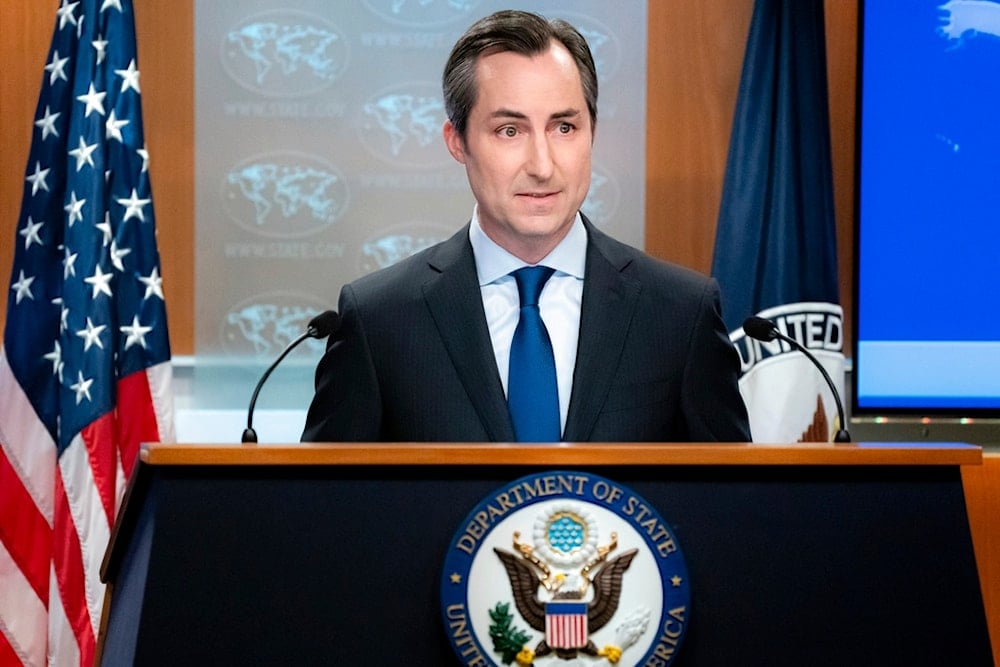Miller: US policies for Middle East unchanged amid transition period
The US State Department reaffirms its commitment to Biden's Middle East policies, including alleged efforts to end the wars on Gaza and Lebanon.
-

State Department spokesperson Matthew Miller during a news briefing at the State Department on Tuesday, July 18, 2023, in Washington. (AP)
In a recent press briefing, US State Department spokesperson Matthew Miller emphasized that the US will continue to pursue current policies in the Middle East under US President Joe Biden's leadership until the end of his term.
Responding to questions about potential policy shifts under the incoming administration, Miller stated, "There is one president at a time."
Miller then claimed, once more, that the US "will continue to pursue an end to the war in Gaza, an end to the war in Lebanon, a surge of humanitarian assistance [to Gaza]."
He added, "We will continue to pursue the policies that [President Biden] has set forward" until noon on January 20, 2025.
Miller acknowledged that the incoming administration could adopt different policies but underscored that the current focus remains on advancing US national security interests.
Moreover, the spokesperson stressed that the US is not interested in a "temporary end to this conflict" where in the future "Israel" will have to deal with Hamas or other Resistance groups. He said the US sought an "end to this conflict that is durable and won’t just lead to further conflict between Israel and Hamas or Israel and other terrorist groups."
In other words, the US is only interested in a "complete victory" in the Gaza Strip, which would entail the complete dismantling and elimination of the Palestinian Resistance in Gaza.
Miller stated, "We want to see Hamas replaced by a different governing authority in Gaza, and that’s what we’re trying to achieve."
Regarding a question about what the Biden administration could do to ensure that UNRWA remains, Miller reaffirmed US support for the United Nations Relief and Works Agency (UNRWA), despite a ban on funding imposed by Congress back in 2018, when now US President-elect was President. Miller stated that while the law preventing US contributions to UNRWA will not change before President Biden leaves office, the US remains committed to supporting the agency's work.
Additionally, Miller addressed reports of potential ethnic cleansing in Beit Lahia, clarifying that the US has directly engaged with the Israeli occupation government on the matter.
"The Secretary raised it directly with the prime minister when we were there two weeks ago," Miller said, adding that Israeli officials denied the existence of such a plan.
Despite the clear evidence through video footage and reports from on-the-ground journalists, Miller reiterated, in defense of Tel Aviv, that "the prime minister [Netanyahu] said that is not our plan, it’s not what we’re implementing," claiming, also, that the US had equally rejected any such plan.
Trump must deprioritize Middle East to save US: Responsible Statecraft
US President-elect Donald Trump has inherited the wars his Democratic predecessors, Joe Biden and Kamala Harris, started in the Middle East and kickstarts his four-year tenure with the risk of a greater regional conflict and potential US involvement, a direct result of a broader, self-defeating US Middle East policy, according to the Responsible Statecraft.
Jonathan Hoffman, the author of the op-ed titled "Trump now faces 'out of control' conflict in the Middle East," says the solution to the conundrum Trump faces is the "disentanglement and deprioritization" of the Middle East policy.
According to the author, "Israel" has been leading the way for the past 13 months while the US follows.
Thus, Hoffman relates Washington's deep involvement in the Middle East, its "empty threats" and "tepid warnings" to the Israeli occupation, while pumping it full of military aid and weapon provisions, as well as its unmoved diplomatic cover that shields "Israel", to the continuation of the wars in Gaza and Lebanon, both of which are entirely lacking of any achievable political goals.
While the wars rage on in Lebanon and Gaza, amid unrelenting resistance by Hezbollah and Hamas, the US has also found itself in the middle of escalations between "Israel" and Iran by extending aid and defending the occupation against Iran's retaliatory operations in April and October.
Read more: Jared Kushner declines role in potential future Trump administration

 4 Min Read
4 Min Read








